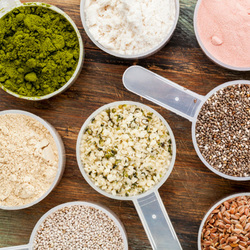 We all know how important adequate protein intake is for good health. Just to put everyone one on the same page here are the main benefits of protein in general. 1) Provides amino acids for muscle repair 2) Protein with each meal balances blood sugar which can aid in healthy weight loss 3) Amino acids from protein are used to make immune cells and neurotransmitters Despite our best efforts most people do not get enough protein from dietary sources alone or we tend to rely on animal proteins that are rich in saturated fats and acidifying amino acids. To maintain muscle building and breakdown the evidence has shown that sedentary individuals require at least 0.8g of protein per kilogram of body weight. This actually goes up to over 1g/kg of body weight for elderly and active adults. That translates to almost 50g of protein a day for an average 60kg (132lbs) women (assuming the bare minimum 0.8). Since getting this amount can be a challenge many people are turning to convenient protein powders to boost their daily intake. With so many options the big question health enthusiasts have is should they use whey or vegetable (soy, rice, pea, hemp etc.) protein? There are PROs and CONs to both. The following breakdown will help you make the decision that is best for you. Whey Protein (source: cow or goat milk) PROs (compare to vegan proteins) · Complete protein – Whey contains the full spectrum of all the essential amino acids. This is key for muscle function and growth · Higher in Branched Chain Amino Acids (BCAAs) – These specific amino acids (leucine, isoleucine, and valine) stimulate muscle growth and maintenance · Supports detoxification – Whey is higher in the amino acid cysteine which is the key precursor to glutathione, a powerful detoxifier and antioxidant. · Boosts the immune system – Our immune cells require amino acids to be produced but whey contains special molecules called immunoglobulins that stimulate immune function. - Contains Lactoferrin – a key immune boosting molecule which has a powerful anti-microbial and anti-cancer effect · Better taste than some veggie proteins – This point is debatable but most people prefer the taste of whey based proteins. CONs · Dairy “sensitivity and allergy - many people are "sensitive" (mildly allergic) or outright allergic to various components in dairy (including whey). This produces various symptoms such as digestive discomfort, headaches, and excess mucus production. For these people it also can increase inflammation at the level of the gut lining. Dairy is among the foods that are most allergenic (along with eggs, soy, wheat, corn and citrus fruits). · Dairy milk consumption is linked to acne, cancer and other diseases - Some studies suggest that dairy products can promote the growth of cancerous cells because of the high amounts to galactose, casein and insulin-like growth factor I (IGF-1). On the flipside calcium from dairy has been shown to prevent colon cancer. Overall the evidence is far from confirmed and is still considered controversial. Whey protein contains very little casein and galactose but because of the dairy source some people choose to avoid it · Possible contamination - with hormones and antibiotics and some studies do show that dairy products have a high level of dioxins and other environmental contaminants. This has not been confirmed in whey products. Veggie proteins (source: soy, pea, rice) PROs · Considered hypoallergenic – rice and pea protein is usually well tolerated by people. Soy can be a common food allergen so the above points about food allergies apply for it as well. - Part of a detox program – because rice and pea proteins are less allergenic they are usually part of functional foods that are used during detox programs such as an elimination diet. · Easier to digest – This point is debatable but theoretically if a food is not allergenic for a person they are better able to breakdown and digest it. CONs · Taste – the taste of veggie proteins (especially pea and rice) can be poorly tolerated by some people however this is personally preference. · Not optimal for muscle building – vegan proteins have lower amounts of amino acids required for muscle building and glutathione production compare to whey. · Possibly contaminated – There have been reports of rice proteins being contaminated with arsenic but this has not been confirmed and may have been an isolated incident. So there are PROs and CONs to both sources of protein. The choice is up to you but I think it comes down to personal preference and individual tolerability. If you are not dairy sensitive then a high quality whey protein can really offer some unique health benefits that are not present in veggie proteins. Otherwise you maybe better off with vegetarian sources. References Chernoff R. Protein and older adults. J Am Coll Nutr. 2004 Dec;23(6 Suppl):627S-630S. Grant EC. Food allergies and migraine. Lancet. 1979 May 5;1(8123):966-9. Chan JM, Stampfer MJ, Ma J, Gann PH, Gaziano JM, Giovannucci E. Dairy products, calcium, and prostate cancer risk in the Physicians’ Health Study. Am J Clin Nutr. 2001;74:549-554. L.-Q. Qin, J.-Y. Xu, P.-Y. Wang, T. Kaneko, K. Hoshi, A. Sato. Milk consumption is a risk factor for prostate cancer: Meta-analysis of case-control studies. Nutr Cancer. 2004 48(1):22 - 27. Larsson SC, Orsini N, Wolk A. Milk, milk products and lactose intake and ovarian cancer risk: a meta-analysis of epidemiological studies. Int J Cancer. 2006;118(2):431-441. B. Melnik. Milk consumption: Aggravating factor of acne and promoter of chronic diseases of western societies. J Dtsch Dermatol Ges, 7(4):364{370, 2009.
0 Comments
|
Welcome To My Blog
My goal is to post thought-provoking and informative articles so you can learn and apply the latest news from the world of natural health. Feel free to post comments and start a conversation. Stay tuned to my twitter and facebook feeds for the latest posts.
Archives
December 2015
|

 RSS Feed
RSS Feed

